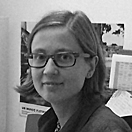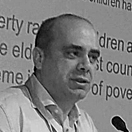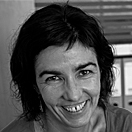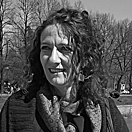
The MenRoles team includes scholars with a strong and prolonged research experience in the field of family and gender issues as well as extensive knowledge of quantitative and qualitative techniques of biographical analysis.

PRINCIPAL INVESTIGATOR
Teresa Martín-García holds her PhD in Political and Social Sciences at the European University Institute in Florence (2005) and is also Doctor-member at the Juan March Institute in Madrid (2006). She has been Visiting Fellow at the Collegio Carlo Alberto in Moncalieri (Turin), I3P Research Fellow at the CSIC (Madrid) and research assistant at the European University Institute (Florence). She has also been visiting researcher at the Department of Sociology in Pompeu Fabra University (Barcelona) and the Max Planck Institute for Demographic Research (Rostock). She has been part-time associate professor at Suffolk University (Madrid) and visiting professor at Pompeu Fabra University, where she has taught courses on Sociology of the Family and Social Demography. Her research interests lie in fertility, the (new) family formation process in Western societies, the intertwining of the education, work and family biographies for both women and men and the new role of men in family dynamics. She is currently a tenured scientist within the research group on Demographic Dynamics at the Center for Human and Social Sciences (CCHS) of the Spanish Council for Scientific Research, Madrid.
Research Team
 Teresa Castro Martín completed her Ph.D. in Sociology at the University of Wisconsin-Madison in 1990. From 1990 to 1996, she worked as a Population Affairs Officer at the United Nations Population Division, and in 1996 she joined the Spanish National Research Council, where she is currently a Research Professor. Her research focuses on the causes and consequences of lowest-low fertility in Southern Europe, on global changes in partnership formation and family patterns, and on the linkages between conjugal, reproductive and work biographies among young adults. She is also interested on nuptiality patterns and reproductive health issues in Latin America.
Teresa Castro Martín completed her Ph.D. in Sociology at the University of Wisconsin-Madison in 1990. From 1990 to 1996, she worked as a Population Affairs Officer at the United Nations Population Division, and in 1996 she joined the Spanish National Research Council, where she is currently a Research Professor. Her research focuses on the causes and consequences of lowest-low fertility in Southern Europe, on global changes in partnership formation and family patterns, and on the linkages between conjugal, reproductive and work biographies among young adults. She is also interested on nuptiality patterns and reproductive health issues in Latin America.
 Julia Cordero is currently a postdoctoral researcher at the Pompeu Fabra University. She holds a Ph.D. in Sociology from Complutense University of Madrid (December, 2011), and a master degree in Social Sciences and a Doctor-membership from Juan March Institute. She also holds a master degree in Population from FLACSO, Mexico. Prior to joining the ERC Advanced Grant project “Family Polarization”, she was a “Max Weber” postdoctoral fellow at the European University Institute in Florence.
Julia Cordero is currently a postdoctoral researcher at the Pompeu Fabra University. She holds a Ph.D. in Sociology from Complutense University of Madrid (December, 2011), and a master degree in Social Sciences and a Doctor-membership from Juan March Institute. She also holds a master degree in Population from FLACSO, Mexico. Prior to joining the ERC Advanced Grant project “Family Polarization”, she was a “Max Weber” postdoctoral fellow at the European University Institute in Florence.
 Clara Cortina Trillais lecturer in Sociology at the Department of Political and Social Sciences at the Universitat Pompeu Fabra (UPF). In 2007 she completed her PhD in Demography at the Universitat Autònoma de Barcelona, where she also obtained a B.A. in Political Science and Administration (2002). Her current research activities are focused on the international comparison of family and nuptiality patterns. She participates in the international research project “Changing families and Sustainable Societies: Policy Contexts and diversity over the life course”, recently granted by the 7th Framework Program of the European Commission. She is also member of the Nuptiality Panel of the International Union for the Scientific Studies of Population (IUSSP).
Clara Cortina Trillais lecturer in Sociology at the Department of Political and Social Sciences at the Universitat Pompeu Fabra (UPF). In 2007 she completed her PhD in Demography at the Universitat Autònoma de Barcelona, where she also obtained a B.A. in Political Science and Administration (2002). Her current research activities are focused on the international comparison of family and nuptiality patterns. She participates in the international research project “Changing families and Sustainable Societies: Policy Contexts and diversity over the life course”, recently granted by the 7th Framework Program of the European Commission. She is also member of the Nuptiality Panel of the International Union for the Scientific Studies of Population (IUSSP).
 Irene Lapuerta holds a PhD in Social and Political Science from Pompeu Fabra University and, since 2009, works as a lecturer at the Department of Social Work of the Public University of Navarre. Her research fields are sociology of the family, female labor force participation, gender inequalities and family policies. Her doctoral dissertation, entitled “Motherhood, Employment and Parental Leave Policies”, was awarded by the Spanish Congress with the prize to the best thesis in the field of Political Science and Sociology in 2012 and by the Economic and Social Council of the Pomepu Fabra University with the prize to the knowledge transfer in the area of social sciences. Lapuerta has worked in several research projects funded by national and international institutions.
Irene Lapuerta holds a PhD in Social and Political Science from Pompeu Fabra University and, since 2009, works as a lecturer at the Department of Social Work of the Public University of Navarre. Her research fields are sociology of the family, female labor force participation, gender inequalities and family policies. Her doctoral dissertation, entitled “Motherhood, Employment and Parental Leave Policies”, was awarded by the Spanish Congress with the prize to the best thesis in the field of Political Science and Sociology in 2012 and by the Economic and Social Council of the Pomepu Fabra University with the prize to the knowledge transfer in the area of social sciences. Lapuerta has worked in several research projects funded by national and international institutions.
 Pau Marí-Kloseis Assistant Professor of Sociology at the University of Zaragoza and research affiliate at the Institute of Public Goods and Policies of the Spanish National Research Council (CSIC). He holds a PhD in Sociology from the Universidad Autónoma de Madrid, a Master of Arts degree from the University of Chicago and a Master in Social Sciences from the Centre for Advanced Studies in Social Sciences (Juan March Institute). His research interests lie in areas of childhood poverty, education, transition to adulthood, marital relationships, and social policies. He recently co-edited the book The Mediterranean Regime and the Economic Crisis (Routledge 2014). He currently participates in the project Families & Societies within the VIIth Framework Program, COST Interfasol on Intergenerational Relations, and leads several research projects in Spain about child poverty, inequality and the crisis, and family policies.
Pau Marí-Kloseis Assistant Professor of Sociology at the University of Zaragoza and research affiliate at the Institute of Public Goods and Policies of the Spanish National Research Council (CSIC). He holds a PhD in Sociology from the Universidad Autónoma de Madrid, a Master of Arts degree from the University of Chicago and a Master in Social Sciences from the Centre for Advanced Studies in Social Sciences (Juan March Institute). His research interests lie in areas of childhood poverty, education, transition to adulthood, marital relationships, and social policies. He recently co-edited the book The Mediterranean Regime and the Economic Crisis (Routledge 2014). He currently participates in the project Families & Societies within the VIIth Framework Program, COST Interfasol on Intergenerational Relations, and leads several research projects in Spain about child poverty, inequality and the crisis, and family policies.
Working Team
 Wanda Cabella is anthropologist (Universidad de la República, Uruguay) and Doctor in Demography (Nucleo de Estudos de População, UNICAMP-Brasil). Her research is mainly concerned with family, nuptiality and fertility. At present, she is also interested in the relationship between family processes and child development. She is the director of the Population Program at the Social Science Faculty (Universidad de la República), and Editor of the Revista Latinoamericana de Población.
Wanda Cabella is anthropologist (Universidad de la República, Uruguay) and Doctor in Demography (Nucleo de Estudos de População, UNICAMP-Brasil). Her research is mainly concerned with family, nuptiality and fertility. At present, she is also interested in the relationship between family processes and child development. She is the director of the Population Program at the Social Science Faculty (Universidad de la República), and Editor of the Revista Latinoamericana de Población.
 Nicole Hiekel is a post-doctoral researcher at the Netherlands Interdisciplinary Demographic Institute (NIDI/KNAW)/University of Groningen in The Hague, the Netherlands. In 2014, she received her Ph.D. from the VU University Amsterdam for her dissertation: “The different meanings of cohabitation across Europe. How cohabiters view their unions and differ in their plans and behaviors”. She has specialized in family sociology and social demography. She currently works in the research project “Contexts of Opportunity (CONOPP)” that received funding from the European Research Council for an advanced grant awarded to Prof. Aart Liefbroer.
Nicole Hiekel is a post-doctoral researcher at the Netherlands Interdisciplinary Demographic Institute (NIDI/KNAW)/University of Groningen in The Hague, the Netherlands. In 2014, she received her Ph.D. from the VU University Amsterdam for her dissertation: “The different meanings of cohabitation across Europe. How cohabiters view their unions and differ in their plans and behaviors”. She has specialized in family sociology and social demography. She currently works in the research project “Contexts of Opportunity (CONOPP)” that received funding from the European Research Council for an advanced grant awarded to Prof. Aart Liefbroer.
 Benoît Laplante holds a doctorate in sociology from the University of Montreal. His main interest lies in the study of biographies and particularly in the relationship between work and family life. He has specialized in longitudinal statistical methods. Most of his current research deals with the family, fertility and entry into adulthood. They focus on Quebec and Canada, but also in Latin America.
Benoît Laplante holds a doctorate in sociology from the University of Montreal. His main interest lies in the study of biographies and particularly in the relationship between work and family life. He has specialized in longitudinal statistical methods. Most of his current research deals with the family, fertility and entry into adulthood. They focus on Quebec and Canada, but also in Latin America.
 Manuela Naldini is a sociologist, Associate professor of Sociology of the Family, at University of Turin, Italy. The main areas of interests are: Family changes and social policy, comparative welfare state, gender studies, work-family reconciliation issues, childcare, transition to parenthood, motherhood and parenthood.She has published extensively on topics related to welfare state, care and policies and family changes in a comparative perspective.
Manuela Naldini is a sociologist, Associate professor of Sociology of the Family, at University of Turin, Italy. The main areas of interests are: Family changes and social policy, comparative welfare state, gender studies, work-family reconciliation issues, childcare, transition to parenthood, motherhood and parenthood.She has published extensively on topics related to welfare state, care and policies and family changes in a comparative perspective.
 Ignacio Pardo is an Assistant Professor at the Population Studies Program – Faculty of Social Sciences – Universidad de la República (Uruguay) and a member of the National System of Researchers of his country. He received his Ph.D. in Sociology from the Universidad Complutense de Madrid in 2011, after studying Sociology and Demography at the Universidad de la Repùblica in Uruguay. His research interests include several topics within population studies: fertility, family change, transition to adulthood and population policy. He is Associate Editor of the journal of the Latin American Population Association (Revista Latinoamericana de Estudios de Población)
Ignacio Pardo is an Assistant Professor at the Population Studies Program – Faculty of Social Sciences – Universidad de la República (Uruguay) and a member of the National System of Researchers of his country. He received his Ph.D. in Sociology from the Universidad Complutense de Madrid in 2011, after studying Sociology and Demography at the Universidad de la Repùblica in Uruguay. His research interests include several topics within population studies: fertility, family change, transition to adulthood and population policy. He is Associate Editor of the journal of the Latin American Population Association (Revista Latinoamericana de Estudios de Población)
 Marta Séizholds a PhD in Political and Social Sciences from Universitat Pompeu Fabra. She is also an Associate Member (“Doctora Miembro”) of the Carlos III-Juan March Institute of Social Sciences (IC3JM). She currently works as a postdoctoral researcher at the Institute of Economics, Geography and Demography of the Spanish National Research Council (CSIC). Her research focuses on time-use and family-related sociodemographic issues; such as the dynamics of couple specialization, the interrelation of family, employment, income, and educational trajectories, union formation trends, and the impact of the institutional context on such phenomena.
Marta Séizholds a PhD in Political and Social Sciences from Universitat Pompeu Fabra. She is also an Associate Member (“Doctora Miembro”) of the Carlos III-Juan March Institute of Social Sciences (IC3JM). She currently works as a postdoctoral researcher at the Institute of Economics, Geography and Demography of the Spanish National Research Council (CSIC). Her research focuses on time-use and family-related sociodemographic issues; such as the dynamics of couple specialization, the interrelation of family, employment, income, and educational trajectories, union formation trends, and the impact of the institutional context on such phenomena.
 Cristina Solera is currently a researcher in the Department of Cultures, Politics and society at the University of Turin. She graduated in Sociology at the University of Trento and obtained a PhD in Political and Social Sciences at the European University Institute, in Florence. Her doctoral research analysed changes across cohorts in women’s employment patterns over the life course in Italy and Great Britain. Since then, she has been working on the effect of level and type of education on women’s employment and fertility, the link between atypical employment, family formation and employment interruptions, care-work reconciliation strategies (also towards the elderly), and transition to parenthood
Cristina Solera is currently a researcher in the Department of Cultures, Politics and society at the University of Turin. She graduated in Sociology at the University of Trento and obtained a PhD in Political and Social Sciences at the European University Institute, in Florence. Her doctoral research analysed changes across cohorts in women’s employment patterns over the life course in Italy and Great Britain. Since then, she has been working on the effect of level and type of education on women’s employment and fertility, the link between atypical employment, family formation and employment interruptions, care-work reconciliation strategies (also towards the elderly), and transition to parenthood
Other
 PPiiNA Plataforma por permisos iguales e intransferibles de nacimiento y adopción.
PPiiNA Plataforma por permisos iguales e intransferibles de nacimiento y adopción.
